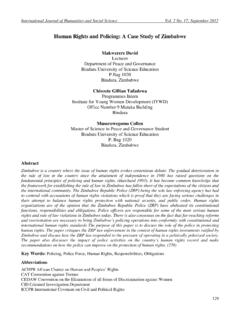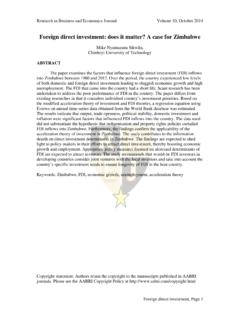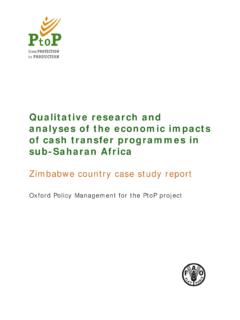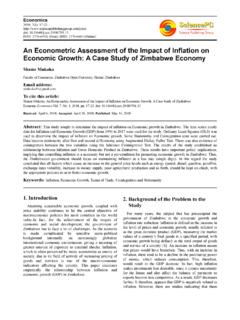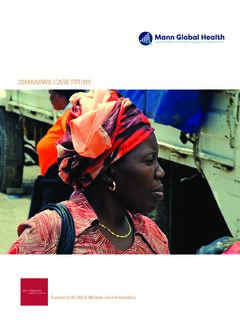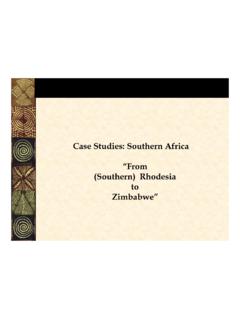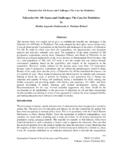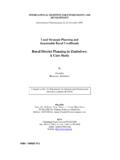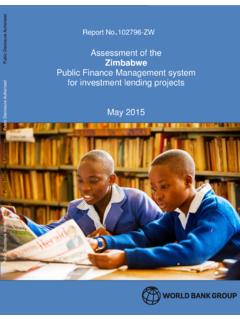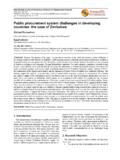Transcription of Resisting Political Corruption: Econet Wireless Zimbabwe ...
1 Electronic copy available at: Resisting Political Corruption: Econet Wireless Zimbabwe (Research case study ) S. Ramakrishna Velamuri Associate Professor China Europe International Business School (CEIBS) 699 Hongfeng Road Pudong, Shanghai 201206 People s Republic of China Tel: +86-21-28905890 (Switchboard); +86-21-28905663 (Direct) Email: Electronic copy available at: This case study documents the story of Zimbabwean entrepreneur Strive Masiyiwa in his quest to obtain a mobile telecommunications license. First the Post and Telecommunications Corporation of Zimbabwe (PTC) and then the Ministry of Information, Post and Telecommunications of the government of President Robert Mugabe place obstacle after obstacle in his path, but Masiyiwa challenges their decisions and actions in the High Court and the Supreme Court.
2 Throughout this five year process (1993-1998), he remains determined to obtain the license through ethical means. A number of individuals and organizations impressed by his values and come to his help and this assistance, along with the independence of the Judiciary, is instrumental in his firm being given the license in July 1998. The case represents an in-depth study of a successful example of resistance to Political Political Corruption: Econet Wireless Zimbabwe (Research case study ) 1 Introduction Strive Masiyiwa was born in 1961 in Zimbabwe . He attended primary school in Zambia and secondary school in Scotland.
3 When he went back to Africa to fight for the liberation of his country from white rule, one of the senior officers told him Look, we re about to win anyway, and what we really need is people like you to help rebuild the country1. He then went back to Britain and obtained a Bachelor s degree in Electrical and Electronic Engineering (Cum Laude) from the University of Wales. After a short stint in the computer industry in Cambridge, England, Masiyiwa returned to Zimbabwe in 1984 and joined the Zimbabwe Posts and Telecommunications Corporation (hereinafter, PTC) as Senior Engineer.
4 Masiyiwa was part of the second wave of black managers to join the PTC, whose management at that time was predominantly white. The first wave of black recruits into management was made up of Political appointees who joined the organization soon after the independence of the country in 1980. The second wave was recruited on merit, rather than on Political considerations. I was the second wave because I came and I joined them at the end of 84 into 85, so I was (part of) the professional group that came and did not require Political patronage to come in. It was very interesting because it was a time of tremendous change.
5 There were senior white management around the whole PTC, and then there were these black appointees in senior positions, that didn t do very much except politics. Below you had an organization that was 80% white, that was over the next two or three years to become 1 As reported in Time magazine s List of Global Influentials 2002; Masiyiwa was named by Time magazine as one of the 15 most influential global leaders in 2002, out of 100 nominees put forward by Time correspondents around the world. 80% black. So it was an interesting time from that point of view to be a young engineer in almost a Political cauldron (Strive Masiyiwa - Interview transcript).
6 Masiyiwa describes his time at PTC as bittersweet, in that on the one hand he was excited at the prospect of making a contribution towards changing a network from one that had been designed for a privileged few into one that had to cater to the needs of the masses; on the other hand, he was frustrated at the highly Political nature of the decision making process. For example, on one occasion he participated in a project for installing a 200 line exchange in a village that had only three subscribers, two of them being the local police station and a crocodile farm.
7 On a personal level though, he was comfortable, because he was respected by his superiors, and was almost always given the resources that he asked for. 2 The First Entrepreneurial Venture Masiyiwa had at that time no intention of starting his own business. His family had owned a small business, and he knew only too well the sacrifices that owning a business entailed. He often had to wake up at 3 AM to help with business activities before going to school. After school, he could only play with his friends for a limited time before he was told we are a serious family, and had to help with the business.
8 He had grown up admiring the families of children whose parents were professionals. During his time at PTC, he felt that he had escaped the hard business life, thanks to his professional degree. His entry into an entrepreneurial career happened by accident, when he decided to build himself a house. He asked his employer for a loan, and as a senior officer was sanctioned what he thought was a generous sum. He then asked an architect friend to design his house, and subsequently went to a builder to get an estimate of the cost. To his surprise, the estimates were almost twice the amount of the loan he had been sanctioned.
9 He then went back to the loan officer at PTC and proposed that he would build the house himself, because he was convinced that it could be built at a much lower cost. This proposal was rejected because he lacked experience in construction. Masiyiwa then set up a building company called Retrofit Engineering in 1987, and started to look for work in order to acquire the experience to build his own house. He was still employed at PTC. He inserted small advertisements in the Classifieds section of newspapers, and gave his mother s phone number for interested parties to call.
10 Because he lacked capital, he focused initially on renovating people s homes or making additions such as garages. At this time, Zimbabwe , and particularly the capital city of Harare, was experiencing a construction boom. Before long he had a building team of 100 people and a full time secretary. Some of his friends got involved in the business. He then decided to concentrate on electrical installation, because he understood it better than building. After a year or two of balancing his full time job at PTC and running his new business, he decided that the latter was big and profitable enough for him to give up his job.
